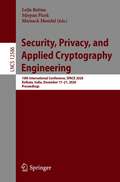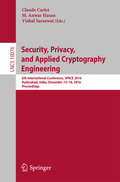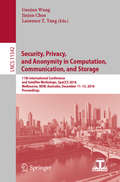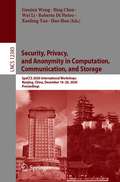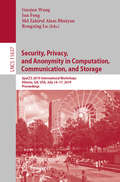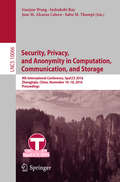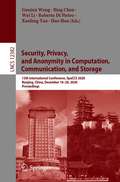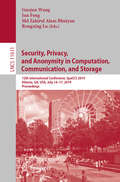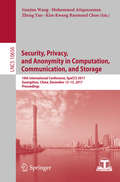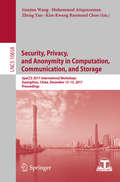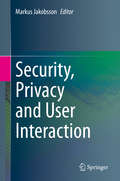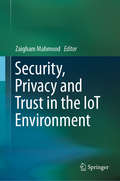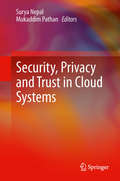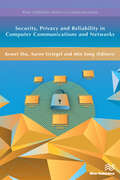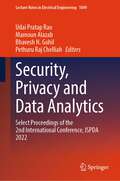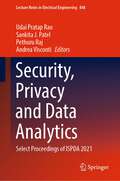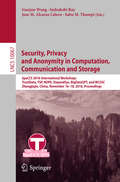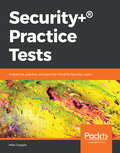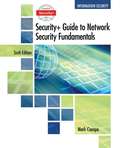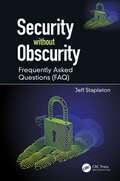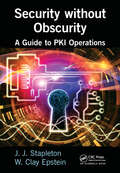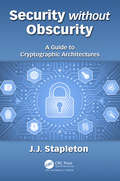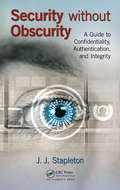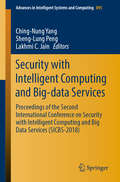- Table View
- List View
Security, Privacy, and Applied Cryptography Engineering: 10th International Conference, SPACE 2020, Kolkata, India, December 17–21, 2020, Proceedings (Lecture Notes in Computer Science #12586)
by Lejla Batina Stjepan Picek Mainack MondalThis book constitutes the refereed proceedings of the 10th International Conference on Security, Privacy, and Applied Cryptography Engineering, SPACE 2020, held in Kolkata, India, in December 2020. Due to COVID-19 pandemic, the conference was held virtual. The 13 full papers presented were carefully reviewed and selected from 48submissions. This annual event is devoted to various aspects of security, privacy, applied cryptography, and cryptographic engineering. This is a very challenging field, requiring the expertise from diverse domains, ranging from mathematics to solid-state circuit design.
Security, Privacy, and Applied Cryptography Engineering
by Claude Carlet M. Anwar Hasan Vishal SaraswatThis book constitutes the refereed proceedings of the 6th International Conference on Security, Privacy, and Applied Cryptography Engineering, SPACE 2016, held in Hyderabad, India, in December 2016. This annual event is devoted to various aspects of security, privacy, applied cryptography, and cryptographic engineering. This is indeed a very challenging field, requiring the expertise from diverse domains, ranging from mathematics to solid-state circuit design.
Security, Privacy, and Anonymity in Computation, Communication, and Storage: Spaccs 2017 International Workshops, Guangzhou, China, December 12-15, 2017, Proceedings (Lecture Notes in Computer Science #10658)
by Jinjun Chen Laurence T. Yang Guojun WangThis book constitutes the refereed proceedings of the 11th International Conference on Security, Privacy, and Anonymity in Computation, Communication, and Storage. The 45 revised full papers were carefully reviewed and selected from 120 submissions. The papers cover many dimensions including security algorithms and architectures, privacy-aware policies, regulations and techniques, anonymous computation and communication, encompassing fundamental theoretical approaches, practical experimental projects, and commercial application systems for computation, communication and storage.
Security, Privacy, and Anonymity in Computation, Communication, and Storage: SpaCCS 2020 International Workshops, Nanjing, China, December 18-20, 2020, Proceedings (Lecture Notes in Computer Science #12383)
by Wei Li Guojun Wang Bing Chen Roberto Di Pietro Xuefeng Yan Hao HanThis book constitutes seven refereed workshops and symposiums, SpaCCS Workshops 2020, which are held jointly with the 13th International Conference on Security, Privacy, and Anonymity in Computation, Communication, and Storage, SpaCCS 2020, in Nanjing, China, in December 2020. The 48 papers were carefully reviewed and selected from 131 submissions and cover a broad range of topics on security, privacy and anonymity in computation communication, and storage, including the 11th International Workshop on Trust, Security and Privacy for Big Data (TrustData 2020), the 10th International Symposium on Trust, Security and Privacy for Emerging Applications (TSP 2020), the 9th International Symposium on Security and Privacy on Internet of Things (SPIoT 2020), the 6th International Symposium on Sensor-Cloud Systems (SCS 2020), the Second International Workshop on Communication, Computing, Informatics and Security (CCIS 2020), the First International Workshop on Intelligence and Security in Next Generation Networks (ISNGN 2020), the First International Symposium on Emerging Information Security and Applications (EISA 2020).
Security, Privacy, and Anonymity in Computation, Communication, and Storage: SpaCCS 2019 International Workshops, Atlanta, GA, USA, July 14–17, 2019, Proceedings (Lecture Notes in Computer Science #11637)
by Rongxing Lu Jun Feng Guojun Wang Md Zakirul Alam BhuiyanThis book constitutes the refereed proceedings of six symposiums and two workshops co-located with SpaCCS 2019, the 12th International Conference on Security, Privacy, and Anonymity in Computation, Communication, and Storage. The 26 full papers were carefully reviewed and selected from 75 submissions. This year's symposiums and workshops are: SPIoT 2019 – Security and Privacy of Internet of Things; TSP 2019 – Trust, Security and Privacy for Emerging Applications; SCS 2019 – Sensor-Cloud Systems; UbiSafe 2019 – UbiSafe Computing; ISSR 2019 – Security in e-Science and e-Research; CMRM 2019 – Cybersecurity Metrics and Risk Modeling.
Security, Privacy, and Anonymity in Computation, Communication, and Storage: 9th International Conference, SpaCCS 2016, Zhangjiajie, China, November 16-18, 2016, Proceedings (Lecture Notes in Computer Science #10066)
by Guojun Wang, Indrakshi Ray, Jose M. Alcaraz Calero and Sabu M. ThampiThis book constitutes the refereed proceedings of the 9th International Conference on on Security, Privacy and Anonymity in Computation, Communication and Storage, SpaCCS 2016, held in Zhangjiajie, China, in November 2016.The 40 papers presented in this volume were carefully reviewed and selected from 110 submissions. They are organized in topical sections including security algorithms and architectures, privacy-aware policies, regulations and techniques, anonymous computation and communication, encompassing fundamental theoretical approaches, practical experimental projects, and commercial application systems for computation, communication and storage.
Security, Privacy, and Anonymity in Computation, Communication, and Storage: 13th International Conference, SpaCCS 2020, Nanjing, China, December 18-20, 2020, Proceedings (Lecture Notes in Computer Science #12382)
by Wei Li Guojun Wang Bing Chen Roberto Di Pietro Xuefeng Yan Hao HanThis book constitutes the refereed proceedings of the 13th International Conference on Security, Privacy, and Anonymity in Computation, Communication, and Storage, SpaCCS 2020, held in Nanjing, China, in December 2020. The 30 full papers were carefully reviewed and selected from 88 submissions. The papers cover many dimensions including security algorithms and architectures, privacy-aware policies, regulations and techniques, anonymous computation and communication, encompassing fundamental theoretical approaches, practical experimental projects, and commercial application systems for computation, communication and storage. SpaCCS 2020 is held jointly with the 11th International Workshop on Trust, Security and Privacy for Big Data (TrustData 2020), the 10th International Symposium on Trust, Security and Privacy for Emerging Applications (TSP 2020), the 9th International Symposium on Security and Privacy on Internet of Things (SPIoT 2020), the 6th International Symposium on Sensor-Cloud Systems (SCS 2020), the 2nd International Workshop on Communication, Computing, Informatics and Security (CCIS 2020), the First International Workshop on Intelligence and Security in Next Generation Networks (ISNGN 2020), the First International Symposium on Emerging Information Security and Applications (EISA 2020).
Security, Privacy, and Anonymity in Computation, Communication, and Storage: 12th International Conference, SpaCCS 2019, Atlanta, GA, USA, July 14–17, 2019, Proceedings (Lecture Notes in Computer Science #11611)
by Rongxing Lu Jun Feng Guojun Wang Md Zakirul Alam BhuiyanThis book constitutes the refereed proceedings of the 12th International Conference on Security, Privacy, and Anonymity in Computation, Communication, and Storage, SpaCCS 2019, held in Atlanta, GA, USA in July 2019. The 37 full papers were carefully reviewed and selected from 109 submissions.The papers cover many dimensions including security algorithms and architectures, privacy-aware policies, regulations and techniques, anonymous computation and communication, encompassing fundamental theoretical approaches, practical experimental projects, and commercial application systems for computation, communication and storage.
Security, Privacy, and Anonymity in Computation, Communication, and Storage
by Jose M. Alcaraz Calero Sabu M. Thampi Guojun Wang Indrakshi RayThis book constitutes the refereed proceedings of the 9th International Conference on on Security, Privacy and Anonymity in Computation, Communication and Storage, SpaCCS 2016, held in Zhangjiajie, China, in November 2016. The 40 papers presented in this volume were carefully reviewed and selected from 110 submissions. They are organized in topical sections including security algorithms and architectures, privacy-aware policies, regulations and techniques, anonymous computation and communication, encompassing fundamental theoretical approaches, practical experimental projects, and commercial application systems for computation, communication and storage.
Security, Privacy, and Anonymity in Computation, Communication, and Storage
by Guojun Wang Kim-Kwang Raymond Choo Zheng Yan Mohammed AtiquzzamanThis book constitutes the refereed proceedings of 11 symposia and workshops held at the 10th International Conference on Security, Privacy and Anonymity in Computation, Communication, and Storage, SpaCCS 2017, held in Guangzhou, China, in December 2017. The total of 75 papers presented in this volume was carefully reviewed and selected from a total of 190 submissions to all workshops: UbiSafe 2017: The 9th IEEE International Symposium on UbiSafe Computing ISSR 2017: The 9th IEEE International Workshop on Security in e-Science and e-Research TrustData 2017: The 8th International Workshop on Trust, Security and Privacy for Big Data TSP 2017: The 7th International Symposium on Trust, Security and Privacy for Emerging Applications SPIoT 2017: The 6th International Symposium on Security and Privacy on Internet of Things NOPE 2017: The 5th International Workshop on Network Optimization and Performance Evaluation DependSys 2017: The Third International Symposium on Dependability in Sensor, Cloud, and Big Data Systems and Applications SCS 2017: The Third International Symposium on Sensor-Cloud Systems WCSSC 2017: The Second International Workshop on Cloud Storage Service and Computing MSCF 2017: The First International Symposium on Multimedia Security and Digital Forensics SPBD 2017: The 2017 International Symposium on Big Data and Machine Learning in Information Security, Privacy and Anonymity
Security, Privacy, and Anonymity in Computation, Communication, and Storage
by Guojun Wang Kim-Kwang Raymond Choo Zheng Yan Mohammed AtiquzzamanThis book constitutes the refereed proceedings of 11 symposia and workshops held at the 10th International Conference on Security, Privacy and Anonymity in Computation, Communication, and Storage, SpaCCS 2017, held in Guangzhou, China, in December 2017. The total of 75 papers presented in this volume was carefully reviewed and selected from a total of 190 submissions to all workshops: UbiSafe 2017: The 9th IEEE International Symposium on UbiSafe Computing ISSR 2017: The 9th IEEE International Workshop on Security in e-Science and e-Research TrustData 2017: The 8th International Workshop on Trust, Security and Privacy for Big Data TSP 2017: The 7th International Symposium on Trust, Security and Privacy for Emerging Applications SPIoT 2017: The 6th International Symposium on Security and Privacy on Internet of Things NOPE 2017: The 5th International Workshop on Network Optimization and Performance Evaluation DependSys 2017: The Third International Symposium on Dependability in Sensor, Cloud, and Big Data Systems and Applications SCS 2017: The Third International Symposium on Sensor-Cloud Systems WCSSC 2017: The Second International Workshop on Cloud Storage Service and Computing MSCF 2017: The First International Symposium on Multimedia Security and Digital Forensics SPBD 2017: The 2017 International Symposium on Big Data and Machine Learning in Information Security, Privacy and Anonymity
Security, Privacy and User Interaction (Springerbriefs In Computer Science Ser.)
by Markus JakobssonThis book makes the case that traditional security design does not take the end-user into consideration, and therefore, fails. This book goes on to explain, using a series of examples, how to rethink security solutions to take users into consideration. By understanding the limitations and habits of users – including malicious users, aiming to corrupt the system – this book Illustrates how better security technologies are made possible. Traditional security books focus on one of the following areas: cryptography, security protocols, or existing standards. They rarely consider the end user as part of the security equation, and when they do, it is in passing. This book considers the end user as the most important design consideration, and then shows how to build security and privacy technologies that are both secure and which offer privacy. This reduces the risk for social engineering and, in general, abuse.Advanced-level students interested in software engineering, security and HCI (Human Computer Interaction) will find this book useful as a study guide. Engineers and security practitioners concerned with abuse and fraud will also benefit from the methodologies and techniques in this book.
Security, Privacy and Trust in the IoT Environment
by Zaigham MahmoodThe Internet of Things (IoT) is a network of devices and smart things that provides a pervasive environment in which people can interact with both the cyber and physical worlds. As the number and variety of connected objects continue to grow and the devices themselves become smarter, users’ expectations in terms of adaptive and self-governing digital environments are also on the rise. Although, this connectivity and the resultant smarter living is highly attractive to general public and profitable for the industry, there are also inherent concerns. The most challenging of these refer to the privacy and security of data, user trust of the digital systems, and relevant authentication mechanisms. These aspects call for novel network architectures and middleware platforms based on new communication technologies; as well as the adoption of novel context-aware management approaches and more efficient tools and devices.In this context, this book explores central issues of privacy, security and trust with regard to the IoT environments, as well as technical solutions to help address them. The main topics covered include:• Basic concepts, principles and related technologies• Security/privacy of data, and trust issues• Mechanisms for security, privacy, trust and authentication• Success indicators, performance metrics and future directions.This reference text is aimed at supporting a number of potential audiences, including• Network Specialists, Hardware Engineers and Security Experts • Students, Researchers, Academics and Practitioners.
Security, Privacy and Trust in Cloud Systems
by Mukaddim Pathan Surya NepalThe book compiles technologies for enhancing and provisioning security, privacy and trust in cloud systems based on Quality of Service requirements. It is a timely contribution to a field that is gaining considerable research interest, momentum, and provides a comprehensive coverage of technologies related to cloud security, privacy and trust. In particular, the book includes - Cloud security fundamentals and related technologies to-date, with a comprehensive coverage of evolution, current landscape, and future roadmap. - A smooth organization with introductory, advanced and specialist content, i.e. from basics of security, privacy and trust in cloud systems, to advanced cartographic techniques, case studies covering both social and technological aspects, and advanced platforms. - Case studies written by professionals and/or industrial researchers. - Inclusion of a section on Cloud security and eGovernance tutorial that can be used for knowledge transfer and teaching purpose. - Identification of open research issues to help practitioners and researchers. The book is a timely topic for readers, including practicing engineers and academics, in the domains related to the engineering, science, and art of building networks and networked applications. Specifically, upon reading this book, audiences will perceive the following benefits: 1. Learn the state-of-the-art in research and development on cloud security, privacy and trust. 2. Obtain a future roadmap by learning open research issues. 3. Gather the background knowledge to tackle key problems, whose solutions will enhance the evolution of next-generation secure cloud systems.
Security, Privacy and Reliability in Computer Communications and Networks
by Min Song Kewei Sha Aaron StriegelFuture communication networks aim to build an intelligent and efficient living environment by connecting a variety of heterogeneous networks to fulfill complicated tasks. These communication networks bring significant challenges in building secure and reliable communication networks to address the numerous threat and privacy concerns. New research technologies are essential to preserve privacy, prevent attacks, and achieve the requisite reliability. Security, Privacy and Reliability in Computer Communications and Networks studies and presents recent advances reflecting the state-of-the-art research achievements in novel cryptographic algorithm design, intrusion detection, privacy preserving techniques and reliable routing protocols. Technical topics discussed in the book include: Vulnerabilities and Intrusion DetectionCryptographic Algorithms and EvaluationPrivacyReliable Routing ProtocolsThis book is ideal for personnel in computer communication and networking industries as well as academic staff and collegial, master, Ph.D. students in computer science, computer engineering, cyber security, information insurance and telecommunication systems.
Security, Privacy and Data Analytics: Select Proceedings of the 2nd International Conference, ISPDA 2022 (Lecture Notes in Electrical Engineering #1049)
by Pethuru Raj Chelliah Mamoun Alazab Udai Pratap Rao Bhavesh N. GohilThis book constitutes refereed proceedings of the International Conference on Security, Privacy and Data Analytics, ISPDA 2022. The volume covers topics, including big data and analytics, cloud security and privacy, data intelligence, hardware security, network security, blockchain technology and distributed ledger, machine learning for security, and many others. The volume includes novel contributions and the latest developments from researchers across industry and academia working in security, privacy, and data analytics from technological and social perspectives. This book will emerge as a valuable reference for researchers, instructors, students, scientists, engineers, managers, and industry practitioners across the globe.
Security, Privacy and Data Analytics: Select Proceedings of ISPDA 2021 (Lecture Notes in Electrical Engineering #848)
by Pethuru Raj Udai Pratap Rao Sankita J. Patel Andrea ViscontiThis book constitutes refereed proceedings of the International Conference on Security, Privacy and Data Analytics, ISPDA 2021. The volume covers a wide range of topics, including big data and analytics, cloud security and privacy, data intelligence, hardware security, network security, blockchain technology and distributed ledger, machine learning for security, and many others. The volume includes novel contributions and the latest developments from researchers across industry and academia working in security, privacy, and data analytics from technological and social perspectives. The book will serve as a valuable reference resource for academics and researchers across the globe.
Security, Privacy and Anonymity in Computation, Communication and Storage
by Jose M. Alcaraz Calero Sabu M. Thampi Guojun Wang Indrakshi RayThis book constitutes the refereed proceedings of the 9th International Conference on on Security, Privacy and Anonymity in Computation, Communication and Storage, SpaCCS 2016, held in Zhangjiajie, China, in November 2016. The 40 papers presented in this volume were carefully reviewed and selected from 110 submissions. They are organized in topical sections including security algorithms and architectures, privacy-aware policies, regulations and techniques, anonymous computation and communication, encompassing fundamental theoretical approaches, practical experimental projects, and commercial application systems for computation, communication and storage.
Security+® Practice Tests: Prepare for, practice, and pass the CompTIA Security+ exam
by Mike ChappleAce the CompTIA Security+ exam with over 700 practice exam questions written using the style and format of the Security+ exam Key Features Get a detailed breakdown of the type of questions and the exam environment Discover a step-by-step process that guides you through the study process week-by-week Reinforce your learning by solving 100 questions for each domain Book Description Security+ certification is the most popular entry-level certification for cybersecurity professionals. It has no work experience requirement, making it accessible to everyone willing to put in the time to prepare for the exam. Security+? Practice Tests are the perfect tools to prepare for the CompTIA Security+ exam. The first six chapters each cover one of the six Security+ domains. Each of those chapters contains around 100 practice test questions covering the material from that domain. The last two chapters each contain a full-length Security+ practice test that's designed to assess your readiness to take the actual test. At the end of each chapter, you'll find the answers to all of the questions along with detailed explanations to help reinforce your learning of the material. By the end of the book, you'll have enough practice to easily ace the CompTIA Security+ exam. What you will learn Familiarize yourself with the format of the Security+ exam Target your test preparation on each of the Security+ domains Brush up on your understanding by testing yourself on realistic practice questions Discover areas for improvement by comparing your responses to the answers provided Measure your readiness with full-length practice tests Know what to expect on test day and Learn helpful strategies for tackling the different question types Who this book is for This book is designed for service desk analysts, system support engineers, and other IT professionals who want to start their career in managing the IT infrastructure of an organization. Basic knowledge of hardware, software, other relevant components of the IT industry will help you easily grasp the concepts explained in this book.
Security+ Guide To Network Security Fundamentals (Sixth Edition)
by Mark CiampaComprehensive, practical, and completely up to date, best-selling COMPTIA SECURITY+ GUIDE TO NETWORK SECURITY FUNDAMENTALS, 6e, provides a thorough introduction to network and computer security that prepares you for professional certification and career success. Mapped to the new CompTIA Security+ SY0-501 Certification Exam, the text provides comprehensive coverage of all domain objectives. The sixth edition also includes expansive coverage of embedded device security, attacks and defenses, and the latest developments and trends in information security, including new software tools to assess security.
Security without Obscurity: Frequently Asked Questions (FAQ)
by Jeff StapletonSecurity without Obscurity: Frequently Asked Questions (FAQ) complements Jeff Stapleton’s three other Security without Obscurity books to provide clear information and answers to the most commonly asked questions about information security (IS) solutions that use or rely on cryptography and key management methods. There are good and bad cryptography, bad ways of using good cryptography, and both good and bad key management methods. Consequently, information security solutions often have common but somewhat unique issues. These common and unique issues are expressed as an FAQ organized by related topic areas. The FAQ in this book can be used as a reference guide to help address such issues. Cybersecurity is based on information technology (IT) that is managed using IS controls, but there is information, misinformation, and disinformation. Information reflects things that are accurate about security standards, models, protocols, algorithms, and products. Misinformation includes misnomers, misunderstandings, and lack of knowledge. Disinformation can occur when marketing claims either misuse or abuse terminology, alluding to things that are inaccurate or subjective. This FAQ provides information and distills misinformation and disinformation about cybersecurity. This book will be useful to security professionals, technology professionals, assessors, auditors, managers, and hopefully even senior management who want a quick, straightforward answer to their questions. It will serve as a quick reference to always have ready on an office shelf. As any good security professional knows, no one can know everything.
Security without Obscurity: A Guide to PKI Operations
by Jeff Stapleton W. Clay EpsteinMost books on public key infrastructure (PKI) seem to focus on asymmetric cryptography, X.509 certificates, certificate authority (CA) hierarchies, or certificate policy (CP), and certificate practice statements. While algorithms, certificates, and theoretical policy are all excellent discussions, the real-world issues for operating a commercial or
Security without Obscurity: A Guide to Cryptographic Architectures
by Jeff StapletonInformation security has a major gap when cryptography is implemented. Cryptographic algorithms are well defined, key management schemes are well known, but the actual deployment is typically overlooked, ignored, or unknown. Cryptography is everywhere. Application and network architectures are typically well-documented but the cryptographic architecture is missing. This book provides a guide to discovering, documenting, and validating cryptographic architectures. Each chapter builds on the next to present information in a sequential process. This approach not only presents the material in a structured manner, it also serves as an ongoing reference guide for future use.
Security without Obscurity: A Guide to Confidentiality, Authentication, and Integrity
by J.J. StapletonThe traditional view of information security includes the three cornerstones: confidentiality, integrity, and availability; however the author asserts authentication is the third keystone. As the field continues to grow in complexity, novices and professionals need a reliable reference that clearly outlines the essentials. Security without Obscurit
Security with Intelligent Computing and Big-data Services: Proceedings of the Second International Conference on Security with Intelligent Computing and Big Data Services (SICBS-2018) (Advances in Intelligent Systems and Computing #895)
by Lakhmi C. Jain Ching-Nung Yang Sheng-Lung PengThis book presents the proceedings of the 2018 International Conference on Security with Intelligent Computing and Big-data Services (SICBS 2018). With the proliferation of security with intelligent computing and big-data services, the issues of information security, big data, intelligent computing, blockchain technology, and network security have attracted a growing number of researchers. Discussing topics in areas including blockchain technology and applications; multimedia security; information processing; network, cloud and IoT security; cryptography and cryptosystems; as well as learning and intelligent computing and information hiding, the book provides a platform for researchers, engineers, academics and industrial professionals from around the globe to present their work in security-related areas. It not only introduces novel and interesting ideas, but also stimulates discussions and inspires new ideas.
